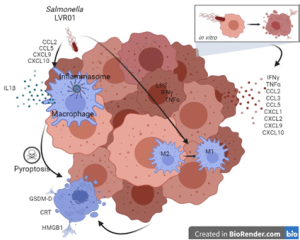Did you know that microorganisms like bacteria or viruses can be used as immunotherapy against cancer? Bacillus Calmette-Guerin (BCG), the vaccine that protects from tuberculosis, has been the preferred immunotherapy for intravesically treating early-stage bladder cancer for the last decades. Salmonella, a different group of bacteria that can cause diarrhea, fever, and stomach cramps upon ingestion of contaminated food or water, can also be engineered to treat malignant neoplasms. In this work, researchers sought to deepen our understanding of the role of macrophages and inflammasome activation in the context of an attenuated Salmonella (LVR01) therapy against melanoma (Figure 1).
The results from this study indicate that LVR01 induces pyroptosis in melanoma cells, and that inflammasome activation in both tumor cells and macrophages is central for the observed antitumor effect (tumor growth retardation and extended survival). In addition, macrophages recruited to the tumor soon after treatment rapidly showed a marked M2/M1 shift, suggesting a favorable imbalance towards M1 phenotype, favoring pro-inflammatory activities that result in cell proliferation inhibition, among other beneficial effects to the host. Nevertheless, this inflammatory profile is lost after a week, which could explain the transient effect of therapy. All in all, the results highlight the caspase 1/11 axis and macrophages as essential players in Salmonella-based cancer immunotherapy that may represent an interesting target for future interventions.
Journal article: Mónaco, A., et al., 2022. Inflammasome activation, NLRP3 engagement and macrophage recruitment to tumor microenvironment are all required for Salmonella antitumor effect. Cancer Immunology, Immunotherapy.
Summary by Amy Mónaco











